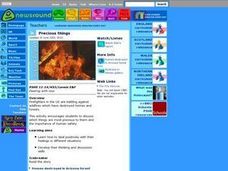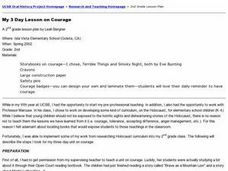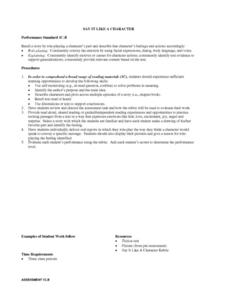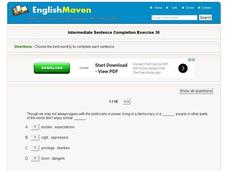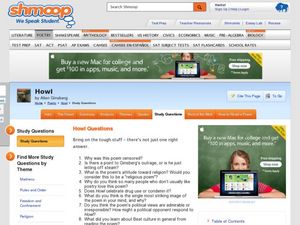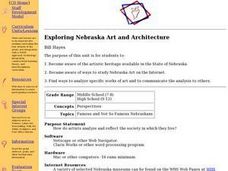Curated OER
Cartoons in the Classroom: Drawn to Freedom
In this current events worksheet, students analyze political cartoons that feature the free exchange of ideas and government criticism. Students then respond to 2 short answer questions.
Curated OER
Adverb Phrases and the Words They Modify
In this adverbs learning exercise, students read 10 sentences and then underline each adverb phrase in each sentence. Students draw an arrow to the word each phrase modifies in each sentence.
Curated OER
New York State Testing Program English Language Arts Book 1--Grade 7 (2006)
In this New York State Testing Program English Language Arts worksheet, students read several passages and two poems and answer reading comprehension questions. Students then write an essay response to one of the passages.
Curated OER
Creating Clinflict Through Gibberish
Students explore ways to communicate and solve conflict. At the beginning of class, students must communicate emotions without using words. They brainstorm important relationships in their lives. Next, groups of students create a...
Curated OER
Non-verbal Cues
Students distinguish between verbal and nonverbal communication. In this communication series lesson plan, students identify the emotions portrayed by photos shown. They role play examples of good and bad listening skills.
Curated OER
Precious Things - Dealing With Loss
Students inquire how to deal with a personal loss. They explore how to deal positively with feelings. Students read stories about individuals who have lost personal possessions. Students rank items in order of preciousness. They...
Curated OER
Number The Stars: Characters and Emotions
In this language arts activity, middle schoolers correlate events of a story with an emotion and then write a description of the story details.
Curated OER
No Second Troy Questions
In this poetry analysis worksheet, students interpret “No Second Troy,” by William Butler Yeats by answering 5 questions based on the relationships featured in the poem.
Curated OER
Poetry: Serve Warmly and More Often
Pupils identify the mood and theme associated with the language of poetry. They discuss personal interpretation in small groups, and as a class and * experiment with language and rhythm.
Curated OER
My 3 Day Lesson on Courage
Second graders focus on what having courage means. They listen to a story about the Holocaust, then create posters which reflect courage, tolerance and acceptance.
Curated OER
The Dancing Flute
Young scholars use a cardboard tubes as props as they create their own dance steps to express the emotions invoked in a portion of The Nutcracker by Tchaikovsky.
Curated OER
Say It Like A Character
Young scholars read a story and retell it to the class by role-playing one of the characters. In groups, they use the correct facial expressions along with body language and voice to convince the others in their group that they are...
Curated OER
Caring
Students experience and discuss the concept of caring for others. They cover the term exclusion as it is related to caring for others and the many factors that are involved when you care for someone else. Looking for the good in others...
Curated OER
Understanding Nouns
High schoolers identify types of nouns. For this grammar lesson, students define what a noun is and identify the various types of nouns in sentences. This grammar lesson is geared towards Special Education high schoolers.
Curated OER
Intermediate Sentence Completion: 30
For this sentence completion worksheet, students complete a sentence with 2 blanks about democracy. Students complete 10 multiple choice questions. Click on "show all" to see the rest of the worksheet.
Curated OER
Howl Questions
In this reading comprehension worksheet, students respond to 5 short answer and essay questions based on the poem "Howl," by Allen Ginsberg.
Curated OER
My Life had stood – a Loaded Gun – Questions
In this poetry discussion worksheet, students consider the elements of poetry as they respond to 6 short answer and essay questions based on the poem "My Life had stood – a Loaded Gun –."
Curated OER
Grade 10 - Personal Development (Mental Well-Being)
Tenth graders propose strategies for enhancing and maintaining emotional health and well-being encourage respect for others.
Curated OER
Exploring Nebraska Art and Architecture
Students explore the art and architecture of Nebraska. Using the internet, they view artwork by various artists and analyze it by using a form given to them by their teacher. They share their analysis with their classmates and discuss...
Curated OER
Good Mental Health Word Search
In this word search learning exercise, students identify fifty words related to good mental health in a word puzzle. Examples include hormones, self esteem, and depressed.
British Library
British Library: 20th Century: Gender and Sexuality
Discover how 20th-century literature explored, questioned, and exploded traditional ideas of gender roles and sexuality.
British Library
British Library: 20th Century: Exploring Identity
Examine how writers have explored identity - through the prisms of ethnicity, class, gender, and sexuality - in the modern world.
British Library
British Library: 20th Century: 20th Century Theatre
Find close readings, critical interpretations, and personal responses to the works of key 20th-century playwrights and practitioners, including Samuel Beckett, Harold Pinter, Shelagh Delaney, and Timberlake Wertenbaker.







